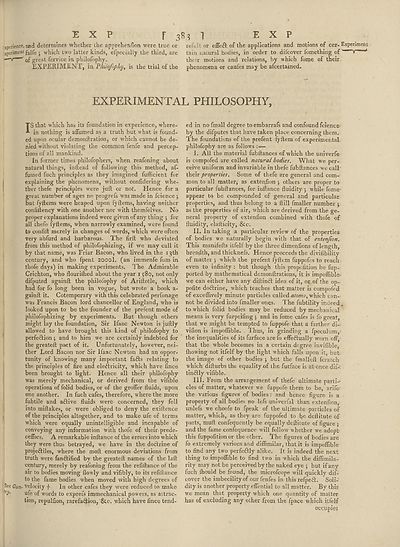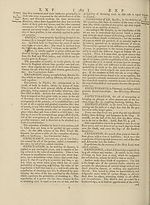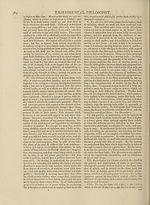Encyclopaedia Britannica, or, a Dictionary of arts, sciences, and miscellaneous literature : enlarged and improved. Illustrated with nearly six hundred engravings > Volume 8, ELE-FOR
(413) Page 383 - Experimental philosophy
Download files
Complete book:
Individual page:
Thumbnail gallery: Grid view | List view

EXP r 383 1 EXP
sperienee, and determines whether ihe apprehenfion were true or
xperiment faife . which two latter kinds, efpecially the third, are
of great fervice in philofophy.
EXPERIMENT, in Phi/ofophy, is the trial of the
refu] t or effeft of the applications and motions of cer-Experiment
tain natural bodies, in order to difeover fomething of ——v—
their motions and relations, by which feme of their
phenomena or caufes may be afcertained.
EXPERIMENTAL PHILOSOPHY,
IS that which has its foundation in experience, where¬
in nothing is affumed as a truth but what is found¬
ed upon ocular demonftration, or which cannot be de¬
nied without violating the common fenfe and percep¬
tions of all mankind.
In former times philofophers, when reafoning about
natural things, inftead of following this method, af¬
fumed fuch principles as they imagined fufficient for
explaining the phenomena, without confidering whe¬
ther thefe principles were, juft or not. Hence for a
great number of ages no progrefs was made in fcience ;
but fyftems were heaped upon fyftems, having neither
conliftency with one another nor with themfelves. No
proper explanations indeed were given of any thing j for
all thefe fyftems, when narrowly examined, were found
to confift merely in changes of words, which were often
very abfurd and barbarous. The firft who deviated
from this method of philofophizing, if we may call it
by that name, was Friar Bacon, who lived in the 13th
century, and who fpent 2000I. (an immenfe fum in
thofe days) in making experiments. The Admirable
Crichton, who flourithed about the year 1 580, not only
difputed againft the philofophy of Ariftotle, which
had for fo long been in vogue, but wrote a book a-
gainft it. Cotemporary with this celebrated perfonage
was Francis Bacon lord chancellor of England, who is
looked upon to be the founder of the prefent mode of
philofophizing by experiments. But though others
might lay the foundation, Sir Ifaac Newton is juftly
allowed to have brought this kind of philofophy to
perfedftion j and to him we are certainly indebted for
the greateft pa»rt of it. Unfortunately, however, nei¬
ther Lord Bacon nor Sir Ifaac Newton had an oppor¬
tunity of knowing many important fa&s relating to
the principles of fire and ele&ricity, which have fince
been brought to light. Hence all their philofophy
was merely mechanical, or derived from the vifible
operations of folid bodies, or of the groffer fluids, upon
one another. In fuch cafes, therefore, where the more
fubtile and aCtive fluids were concerned, they fell
into miftakes, or were obliged to deny the exiftence
of the principles altogether, and to make ufe of terms
which were equally unintelligible and incapable of
conveying any information with thofe of their prede-
ceffors. A remarkable inftance of the errors into which
they were thus betrayed, we have in the doctrine of
projedtiles, where the moft enormous deviations from
truth were fanCtified by the greateft namea of the laft
century, merely by reafoning from the refiftance of the
air to bodies moving flowly and vifibly, to its refiftance
to the fame bodies when moved with high degrees of
Gun- velocity f In other cafes they were reduced to make
'y- ufe of words to exprefs immechanieal powers, as attrac¬
tion, repulfion, rarefaCiion, Stc. which have fince tend¬
ed in no fmall degree toembarrafs and confound fcience
by the difputes that have taken place concerning them.
The foundations of the prefent fyftem of experimental
philofophy are as follow's :—
I. All the material fubftances of which the univerfe
is compofed are called natural bodies. What w'e per¬
ceive uniform and invariable in thefe fubftances we calF
their properties. Some of thefe are general and com¬
mon to all matter, as extenfion 5 others are proper to
particular fubftances, for inftance fluidity ; while fome
appear to be compounded of general and particular
properties, and thus belong to a ftill fmaller number $
as the properties of air, which are derived from the ge¬
neral property of extenfion combined with thofe of
fluidity, elafticity, &c.
II. In taking a particular review of the properties
of bodies we naturally begin with that of extenjion.
This manifefts itfelf by the three dimenfions of length,
breadth, and thicknefs. Hence proceeds the divifibility
of matter j which the prefent fyftem fuppofes to reach
even to infinity : but though this propofition be fup-
ported by mathematical demonftrations, it is impoffible
we can either have any diftinft idea of it, or of the op-
pofite doftrine, which teaches that matter is compofed
of exceflively minute particles called atoms, which can¬
not be divided into fmaller ones. The fubtility indeed ,
to which folid bodies maybe reduced by mechanical
means is very furprifing ; and in fome cafes is fo great,
that wre might be tempted to fuppofe that a farther di-
vifion is impofiible. 'I hus, in grinding a fpeculum,
the inequalities of its furface are fo effeftually worn off,
that the whole becomes in a certain degree invifible,
fliowing not itfelf by the light which falls upon it, but
the image of other bodies $ but the fmalleft fcratch
which difturbs the equality of the furface is at once dif-
tin&ly vifible.
III. From the arrangement of thefe ultimate parti¬
cles of matter, whatever we fuppofe them to be, arife
the various figures of bodies: and hence figure is a
property of all bodies no lefs univerfal than extenfion,
unlefs w'e choofe to fpeak of the ultimate particles of
matter, which, as they are fuppofed to be deflitute of
parts, muft confequently be equally deftitute of figure ;
and the fame confequenee will follow whether we adopt
this fuppofition or the other. The figures of bodies are
fo extremely various and diflimilar, that it is impoflible
to find any two perfectly alike. It is indeed the next
thing to impoflible to find two in which the diflimila-
rity may not be perceived by the naked eye j but if any
fuch fhould be found, the microfcope will quickly dif¬
eover the imbecility of our fenfes in this refpefl. Soli¬
dity is another property efiential to all matter. By this
w'e mean that property which one quantity of matter
has of excluding any other from the fpace which itlelf
occupies
sperienee, and determines whether ihe apprehenfion were true or
xperiment faife . which two latter kinds, efpecially the third, are
of great fervice in philofophy.
EXPERIMENT, in Phi/ofophy, is the trial of the
refu] t or effeft of the applications and motions of cer-Experiment
tain natural bodies, in order to difeover fomething of ——v—
their motions and relations, by which feme of their
phenomena or caufes may be afcertained.
EXPERIMENTAL PHILOSOPHY,
IS that which has its foundation in experience, where¬
in nothing is affumed as a truth but what is found¬
ed upon ocular demonftration, or which cannot be de¬
nied without violating the common fenfe and percep¬
tions of all mankind.
In former times philofophers, when reafoning about
natural things, inftead of following this method, af¬
fumed fuch principles as they imagined fufficient for
explaining the phenomena, without confidering whe¬
ther thefe principles were, juft or not. Hence for a
great number of ages no progrefs was made in fcience ;
but fyftems were heaped upon fyftems, having neither
conliftency with one another nor with themfelves. No
proper explanations indeed were given of any thing j for
all thefe fyftems, when narrowly examined, were found
to confift merely in changes of words, which were often
very abfurd and barbarous. The firft who deviated
from this method of philofophizing, if we may call it
by that name, was Friar Bacon, who lived in the 13th
century, and who fpent 2000I. (an immenfe fum in
thofe days) in making experiments. The Admirable
Crichton, who flourithed about the year 1 580, not only
difputed againft the philofophy of Ariftotle, which
had for fo long been in vogue, but wrote a book a-
gainft it. Cotemporary with this celebrated perfonage
was Francis Bacon lord chancellor of England, who is
looked upon to be the founder of the prefent mode of
philofophizing by experiments. But though others
might lay the foundation, Sir Ifaac Newton is juftly
allowed to have brought this kind of philofophy to
perfedftion j and to him we are certainly indebted for
the greateft pa»rt of it. Unfortunately, however, nei¬
ther Lord Bacon nor Sir Ifaac Newton had an oppor¬
tunity of knowing many important fa&s relating to
the principles of fire and ele&ricity, which have fince
been brought to light. Hence all their philofophy
was merely mechanical, or derived from the vifible
operations of folid bodies, or of the groffer fluids, upon
one another. In fuch cafes, therefore, where the more
fubtile and aCtive fluids were concerned, they fell
into miftakes, or were obliged to deny the exiftence
of the principles altogether, and to make ufe of terms
which were equally unintelligible and incapable of
conveying any information with thofe of their prede-
ceffors. A remarkable inftance of the errors into which
they were thus betrayed, we have in the doctrine of
projedtiles, where the moft enormous deviations from
truth were fanCtified by the greateft namea of the laft
century, merely by reafoning from the refiftance of the
air to bodies moving flowly and vifibly, to its refiftance
to the fame bodies when moved with high degrees of
Gun- velocity f In other cafes they were reduced to make
'y- ufe of words to exprefs immechanieal powers, as attrac¬
tion, repulfion, rarefaCiion, Stc. which have fince tend¬
ed in no fmall degree toembarrafs and confound fcience
by the difputes that have taken place concerning them.
The foundations of the prefent fyftem of experimental
philofophy are as follow's :—
I. All the material fubftances of which the univerfe
is compofed are called natural bodies. What w'e per¬
ceive uniform and invariable in thefe fubftances we calF
their properties. Some of thefe are general and com¬
mon to all matter, as extenfion 5 others are proper to
particular fubftances, for inftance fluidity ; while fome
appear to be compounded of general and particular
properties, and thus belong to a ftill fmaller number $
as the properties of air, which are derived from the ge¬
neral property of extenfion combined with thofe of
fluidity, elafticity, &c.
II. In taking a particular review of the properties
of bodies we naturally begin with that of extenjion.
This manifefts itfelf by the three dimenfions of length,
breadth, and thicknefs. Hence proceeds the divifibility
of matter j which the prefent fyftem fuppofes to reach
even to infinity : but though this propofition be fup-
ported by mathematical demonftrations, it is impoffible
we can either have any diftinft idea of it, or of the op-
pofite doftrine, which teaches that matter is compofed
of exceflively minute particles called atoms, which can¬
not be divided into fmaller ones. The fubtility indeed ,
to which folid bodies maybe reduced by mechanical
means is very furprifing ; and in fome cafes is fo great,
that wre might be tempted to fuppofe that a farther di-
vifion is impofiible. 'I hus, in grinding a fpeculum,
the inequalities of its furface are fo effeftually worn off,
that the whole becomes in a certain degree invifible,
fliowing not itfelf by the light which falls upon it, but
the image of other bodies $ but the fmalleft fcratch
which difturbs the equality of the furface is at once dif-
tin&ly vifible.
III. From the arrangement of thefe ultimate parti¬
cles of matter, whatever we fuppofe them to be, arife
the various figures of bodies: and hence figure is a
property of all bodies no lefs univerfal than extenfion,
unlefs w'e choofe to fpeak of the ultimate particles of
matter, which, as they are fuppofed to be deflitute of
parts, muft confequently be equally deftitute of figure ;
and the fame confequenee will follow whether we adopt
this fuppofition or the other. The figures of bodies are
fo extremely various and diflimilar, that it is impoflible
to find any two perfectly alike. It is indeed the next
thing to impoflible to find two in which the diflimila-
rity may not be perceived by the naked eye j but if any
fuch fhould be found, the microfcope will quickly dif¬
eover the imbecility of our fenfes in this refpefl. Soli¬
dity is another property efiential to all matter. By this
w'e mean that property which one quantity of matter
has of excluding any other from the fpace which itlelf
occupies
Set display mode to:
![]() Universal Viewer |
Universal Viewer | ![]() Mirador |
Large image | Transcription
Mirador |
Large image | Transcription
Images and transcriptions on this page, including medium image downloads, may be used under the Creative Commons Attribution 4.0 International Licence unless otherwise stated. ![]()
| Encyclopaedia Britannica > Encyclopaedia Britannica, or, a Dictionary of arts, sciences, and miscellaneous literature : enlarged and improved. Illustrated with nearly six hundred engravings > Volume 8, ELE-FOR > (413) Page 383 - Experimental philosophy |
|---|
| Permanent URL | https://digital.nls.uk/192268788 |
|---|
| Attribution and copyright: |
|
|---|
| Description | Ten editions of 'Encyclopaedia Britannica', issued from 1768-1903, in 231 volumes. Originally issued in 100 weekly parts (3 volumes) between 1768 and 1771 by publishers: Colin Macfarquhar and Andrew Bell (Edinburgh); editor: William Smellie: engraver: Andrew Bell. Expanded editions in the 19th century featured more volumes and contributions from leading experts in their fields. Managed and published in Edinburgh up to the 9th edition (25 volumes, from 1875-1889); the 10th edition (1902-1903) re-issued the 9th edition, with 11 supplementary volumes. |
|---|---|
| Additional NLS resources: |
|

